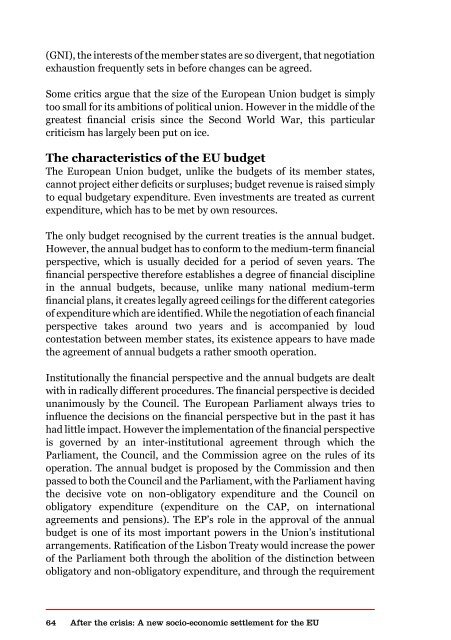Authors Iain Begg | Gabriel Glöckler | Anke Hassel ... - The Europaeum
Authors Iain Begg | Gabriel Glöckler | Anke Hassel ... - The Europaeum
Authors Iain Begg | Gabriel Glöckler | Anke Hassel ... - The Europaeum
Create successful ePaper yourself
Turn your PDF publications into a flip-book with our unique Google optimized e-Paper software.
(GNI), the interests of the member states are so divergent, that negotiation<br />
exhaustion frequently sets in before changes can be agreed.<br />
Some critics argue that the size of the European Union budget is simply<br />
too small for its ambitions of political union. However in the middle of the<br />
greatest financial crisis since the Second World War, this particular<br />
criticism has largely been put on ice.<br />
<strong>The</strong> characteristics of the EU budget<br />
<strong>The</strong> European Union budget, unlike the budgets of its member states,<br />
cannot project either deficits or surpluses; budget revenue is raised simply<br />
to equal budgetary expenditure. Even investments are treated as current<br />
expenditure, which has to be met by own resources.<br />
<strong>The</strong> only budget recognised by the current treaties is the annual budget.<br />
However, the annual budget has to conform to the medium-term financial<br />
perspective, which is usually decided for a period of seven years. <strong>The</strong><br />
financial perspective therefore establishes a degree of financial discipline<br />
in the annual budgets, because, unlike many national medium-term<br />
financial plans, it creates legally agreed ceilings for the different categories<br />
of expenditure which are identified. While the negotiation of each financial<br />
perspective takes around two years and is accompanied by loud<br />
contestation between member states, its existence appears to have made<br />
the agreement of annual budgets a rather smooth operation.<br />
Institutionally the financial perspective and the annual budgets are dealt<br />
with in radically different procedures. <strong>The</strong> financial perspective is decided<br />
unanimously by the Council. <strong>The</strong> European Parliament always tries to<br />
influence the decisions on the financial perspective but in the past it has<br />
had little impact. However the implementation of the financial perspective<br />
is governed by an inter-institutional agreement through which the<br />
Parliament, the Council, and the Commission agree on the rules of its<br />
operation. <strong>The</strong> annual budget is proposed by the Commission and then<br />
passed to both the Council and the Parliament, with the Parliament having<br />
the decisive vote on non-obligatory expenditure and the Council on<br />
obligatory expenditure (expenditure on the CAP, on international<br />
agreements and pensions). <strong>The</strong> EP’s role in the approval of the annual<br />
budget is one of its most important powers in the Union’s institutional<br />
arrangements. Ratification of the Lisbon Treaty would increase the power<br />
of the Parliament both through the abolition of the distinction between<br />
obligatory and non-obligatory expenditure, and through the requirement<br />
64<br />
After the crisis: A new socio-economic settlement for the EU

















